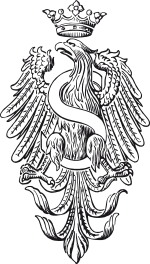Senate of the Republic of Poland
| emblem | Senate building |
|---|---|

|

|
| Basic data | |
| Seat: | Warsaw |
| Legislative period : | 4 years |
| First session: | 1493 |
| MPs: | 100 senators |
| Current legislative period | |
| Last choice: | October 13, 2019 |
| Next choice: | probably 2023 |
| Chair: | Senate Marshal Tomasz Grodzki ( PO ) |
| Distribution of seats: |
Government (49)
Opposition (51)
|
| Website | |
| www.senat.gov.pl | |
The Senate of the Republic of Poland ( Polish Senate Rzeczypospolitej Polskiej ) is the second chamber of the Polish parliament in addition to the first chamber, the Sejm .
history
The history of the Senate can be traced back to the council of royal advisors in 15-16 Century can be traced back.
After the First World War, the parliamentary structure with the Sejm and Senate was continued in the restored Polish state . Unlike before the partitions of Poland , the senators were directly elected. From 1935 a third of the senators were appointed by the state president. Parliament's activities ended with the German occupation of Poland in 1939.
In 1946 a unicameral parliament was created and this decision was confirmed in a fake referendum . In 1989 , after the round table discussions , they returned to the bicameral parliament.
Traditionally, the Senate takes special care of the Polish communities outside Poland, the Polonia .
function
The Senate has an advisory role in legislation . Bills from the Sejm can be rejected by the Senate before they are forwarded to the President , whereby appropriate corrections can be proposed. The decision then lies with the Sejm, as the Senate's right of veto no longer applies if the draft is passed through again.
Electoral system
Elections to the Senate take place every four years, always at the same time as the election to the Sejm , most recently on October 13, 2019 .
100 senators are elected by direct election, one per constituency. The minimum age for senators is 30 years.
According to Article 100 of the Polish Constitution of 1997, political parties or persons entitled to vote are allowed to run a candidate for the office of senator if at least 2,000 support signatures have been collected in the constituency to be run. It is not allowed to run for the Sejm and the Senate at the same time.
As in the Sejm, parliamentary groups are also formed in the Senate according to party affiliation.
Senate Marshal
The Senate Marshal (President of the Senate, Polish Marszałek Senatu ) chairs the meetings of the Senate.
Senate marshals since 1989
| Electoral term | Duration | Marshal | Political party |
|---|---|---|---|
| 1. | 1989-1991 | Andrzej Stelmachowski | OKP |
| 2. | 1991-1993 | August Chełkowski | Solidarność |
| 3. | 1993-1997 | Adam Struzik | PSL |
| 4th | 1997-2001 | Alicja Grześkowiak | AWS |
| 5. | 2001-2005 | Longin Pastusiak | SLD |
| 6th | 2005-2007 | Bogdan Borusewicz | Independently |
| 7th | 2007-2011 | Bogdan Borusewicz | PO |
| 8th. | 2011-2015 | Bogdan Borusewicz | PO |
| 9. | 2015-2019 | Stanislaw Karczewski | PiS |
| 10. | 2019– | Tomasz Grodzki | PO |
Web links
Individual evidence
- ^ Constitution of the Republic of Poland , on de-iure-pl.org, accessed on June 12, 2015

